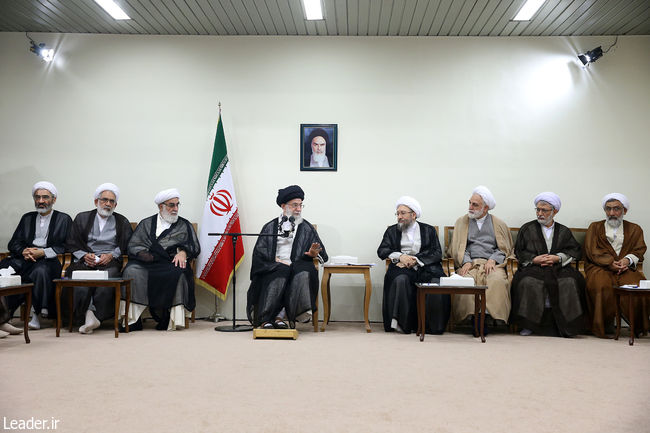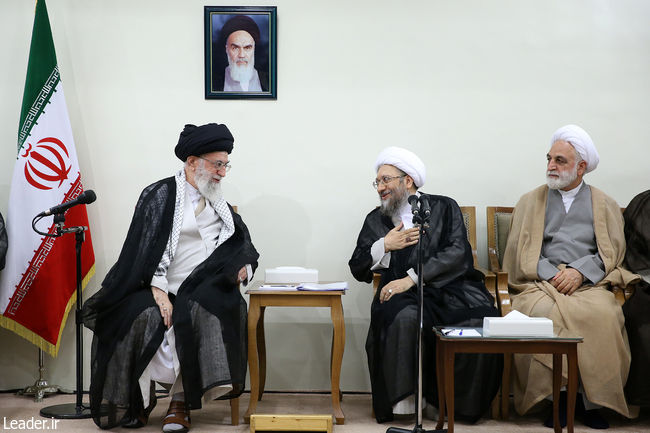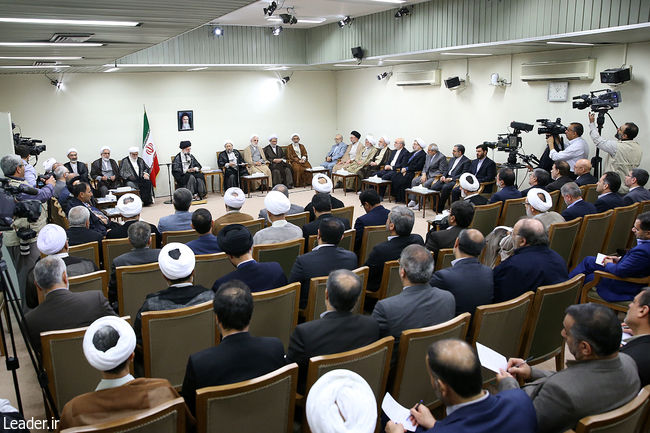In a meeting with the Judiciary chief and officials and the director generals of justice departments across Iran, Leader of the Islamic Revolution Ayatollah Seyyed Ali Khamenei pointed to the jurisdiction and very high and special legal standing of this government branch and its influence upon the macro management of the country and described as necessary a transformative outlook in all the working fields within the Judiciary, saying, “The Judiciary must be the flag-bearer of public rights in society and strongly defend the rights of the people in whatever area necessary and counter lawbreakers and offenders.”
Ayatollah Khamenei described as imperative a “Jihadi and transformative outlook” in planning and operations in the Judiciary and pointed to the high legal standing of this government branch and its influence upon the two other branches and on the general affairs of the country, saying, “It has been stipulated in the Constitution that monitoring the proper implementation of laws and monitoring the proper practice of affairs is the responsibility of the Judiciary and the Administrative Court and the State Inspectorate Organization as two of the main arms of the branch are responsible for these two key tasks.”
Underscoring the need for the Judiciary to tap into legal capacities, the Leader of the Islamic Revolution reiterated, “The revival and restoration of public rights and support for the legitimate rights of the people are among the important responsibilities of the Judiciary and this branch must the flag-bearer in these issues and counter the opponents and adversaries to public rights in any position.”
The Leader enumerated issues such as elections, dust storms and scholarships as examples of areas where support for the rights of the people are needed and added, “Of course, on the issue of scholarships, the case was not followed through properly and what was needed to be done was not carried out.”
The Leader of the Islamic Revolution cited the presence of the Judiciary chief in trans-branch bodies such as the Supreme National Security Council and the Supreme Council of the Cultural Revolution as well as the Supreme Council of Cyberspace as the other legal capacities of this branch and stressed, “Thanks to his character and academic excellence, Ayatollah Amoli Larijani can certainly assert high influence in these assemblies.”
Ayatollah Khamenei also described as very important following through international cases and issues and reiterated, “The Judiciary must engage in such matters as sanctions, US seizures [of Iranian assets] and terrorism or express support for oppressed global figures such as [Nigeria’s] Sheikh Zakzaki or the Muslims of Kashmir and Myanmar from a legal standpoint and resolutely declare its opposing or supportive view so that it would be reflected in the world.”
He described playing a role in the issue of “social maladies” as another responsibility of the Judiciary.
Continuing, the Leader of the Islamic Revolution cited serious confrontation against violations as the requisite for progress in affairs in the Judicial system and the creation of a public perception of the Judiciary as a body that “is a savior, provides hope and gives peace” and appreciated the dispatch of undercover and unknown inspectors to various cities with the aim of discovering and confronting violations, adding, “Step up the inspections as much as you can and reform the Judiciary from within.”
Ayatollah Khamenei pointed to confronting offenders and bringing them to justice and at the same time preserving the dignity of their relatives and family members and reiterated, “Of course, where the honor of the establishment is in danger, the preservation of the honor of the Islamic establishment is a priority and more important, because the people witness and recognize the issues and there should not be the feeling that the Judiciary is not confronting law breakers.”
The Leader cited “encouraging just and righteous judges” as complementary to “punishing and confronting offenders” and told the Judiciary officials to “Popularize and introduce to the society the just, courageous, resolute, fair and diligent judges who are very God-fearing and make judgments wisely and without [special] considerations.”
“The rights of the promoters of virtue and preventers of vice” was another issue that the Leader of the Islamic Revolution underscored, adding, “Some people repeatedly say that some of the articles of the Constitution are in limbo, but apparently they do not consider the eighth article of the Constitution that relates to the promotion of virtue and prevention of vice to be part of the Constitution and pay no attention to this imperative.”
The Leader pointed to his verbal and physical support for the promoters of virtue and preventers of vice, describing the task as a responsibility of the Judiciary.
Ayatollah Khamenei also underscored the issue of “public education” and the adoption of attractive means in teaching the people about their rights.
Summing up his remarks, the Leader described as essential the safekeeping of divine blessings and reiterated, “‘The blessing of the youth,’ ‘the blessing of the Islamic Republic,’ ‘the blessing of the Judiciary and its capabilities,’ ‘the blessing of the people’s companionship with affection for and obedience of the Islamic establishment and Revolution,’ are among God’s great blessings and everyone should make sure that these blessings are not squandered and that they are maximally used.”
At the beginning of the meeting, the Leader of the Islamic Revolution paid tribute to the character of martyr Ayatollah Beheshti as the architect of the Judiciary of the Islamic Republic, adding, “The name of martyr Beheshti is intertwined with the Judiciary because he joined the branch with a pure motive, a strategist mindset and a mentality to found the new judicial structure in the Islamic Republic and provided significant service with wisdom and a transformative outlook in a short period.”
Ayatollah Khamenei also pointed to the presence of prominent personalities at the head of the Judiciary throughout the years after the Revolution, describing Ayatollah Amoli Larijani as a prominent figure with great academic, practical, spiritual and ideological merit and appreciated the endeavors by him and the officials of the Judiciary system, reiterating, “In recent years, important and valuable steps have been taken in the Judiciary and public opinion must be informed of these measures with effective promotional methods.”
Prior to the remarks by the Leader of the Islamic Revolution, the Judiciary chief delivered a report on the services and activities of the branch.
Referring to the last year recommendations of the Leader of the Revolution to the officials of the Judicial system, Ayatollah Amoli Larijani said “‘Fighting corruption and violations inside the Judiciary and strict monitoring of the performance of judges,’ ‘ratifying and promulgating the Fourth Judicial Development Plan,’ promulgating the guidelines for organizing prisoners and reduction of the inmate population by five percent,’ ‘training specialized forces,’ ‘drafting effective judicial bills,’ ‘reflecting the activities of the Judiciary in the media,’ ‘providing legal and judicial education to people,’ ‘clarifying the human rights achievements of the Islamic Republic of Iran,’ and ‘endeavoring to restore Islamic human rights,’ are among the measures and agendas of the system over the past year.”
Pointing to the filing of more than 15 million cases at the judicial system over the past year, the Judiciary chief reiterated, “‘Drafting guidelines to follow up on the policies of Resistance Economy,’ ‘fighting economic fraudsters and providing economic security,’ and ‘developing human resources and increasing the number of judges,’ and ‘developing modern technologies and paying attention to research,’ have been another part of the activities of the Judiciary.”



